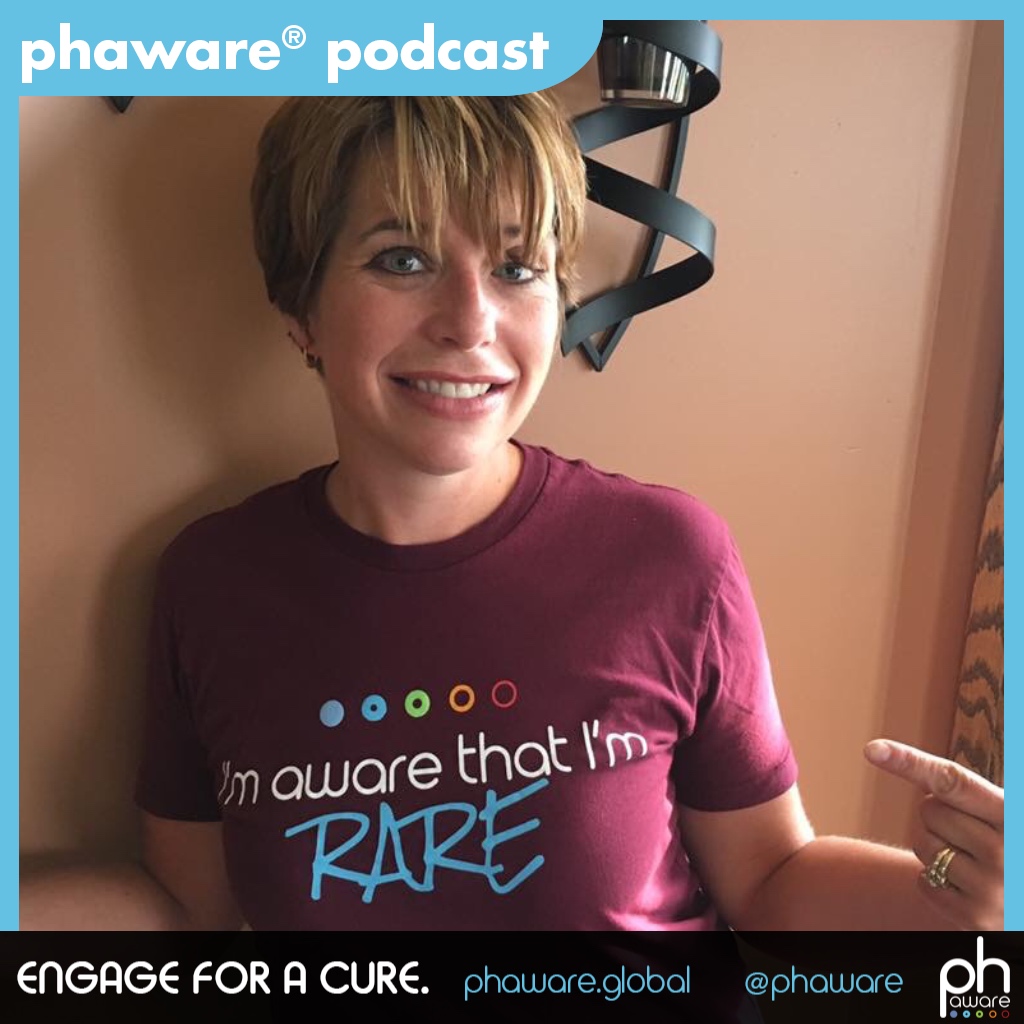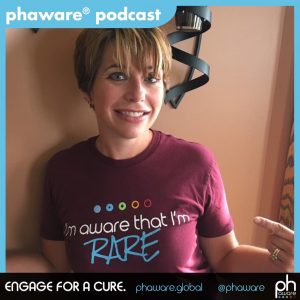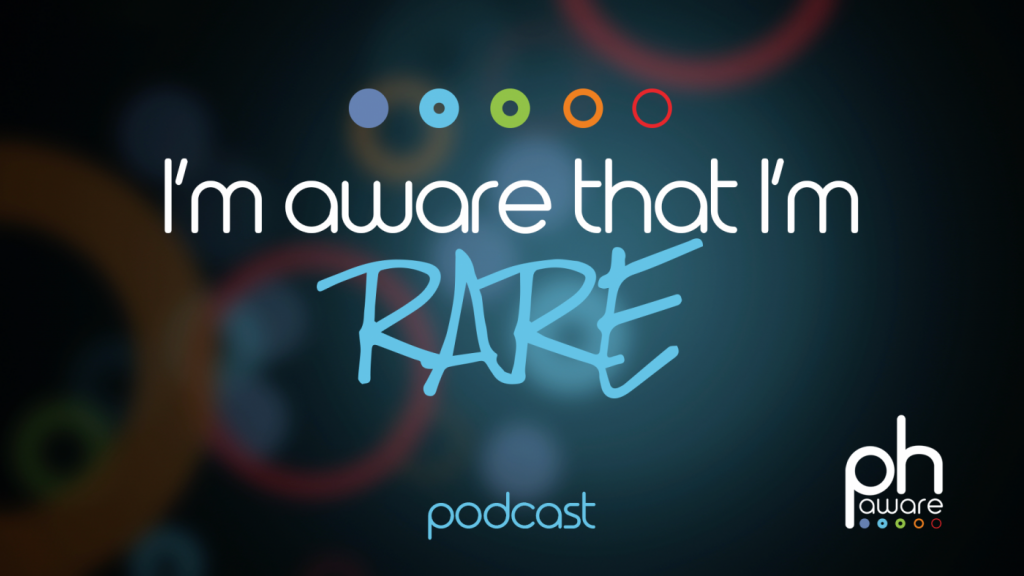Phaware Podcast: Ashley Schroeder

This podcast series, created and produced by phaware, is being offered as a regular guest feature on Pulmonary Hypertension News to bring the voices and life experiences of PH patients, family members, caregivers, healthcare specialists, and others to our readers. You may listen to the podcast directly, or read it via the transcript that runs below.
I’m Aware That I’m Rare: Ashley Schroeder
The phaware® interview (Episode 98)
Ashley Schroeder is a wife, mother of two daughters and a familial pulmonary hypertension patient of five years. Ashley discusses being diagnosed, improving beyond what doctors expected, the importance of finding the right combination of medication and why raising awareness of pulmonary hypertension is so important.
Hi, my name is Ashley Schroeder and I’m from Lore City, Ohio.
My journey with PH began when I was a child.
My parents divorced when I quite young. My father had PH. He and I weren’t very close. I knew he had  something; I didn’t know that it was actually pulmonary hypertension, but he kind of told my mom some of the symptoms to look for in me. She had asked me when I was a kid if I had any of those symptoms. I said, “No,” so we just kind of went from there. Fast forward a lot of years, I’m in my late 20s and I was pregnant with my second daughter. I was push-mowing the lawn that summer and everything was fine, no big deal. I had her in October and then the following spring, I went back out to push mow the lawn again and I couldn’t do it. I was getting light-headed, dizzy.
something; I didn’t know that it was actually pulmonary hypertension, but he kind of told my mom some of the symptoms to look for in me. She had asked me when I was a kid if I had any of those symptoms. I said, “No,” so we just kind of went from there. Fast forward a lot of years, I’m in my late 20s and I was pregnant with my second daughter. I was push-mowing the lawn that summer and everything was fine, no big deal. I had her in October and then the following spring, I went back out to push mow the lawn again and I couldn’t do it. I was getting light-headed, dizzy.
I had noticed that I was having some problems going up and down the stairs at work, just getting a little more out of breath than I thought I should have been. But I was also about 40 pounds overweight at the time, so I didn’t think too much of it. I started to lose weight, I started just watching what I was eating and I lost about 17 pounds. So, I thought, “well my breathing should be getting better soon” and it just never did.
I was at work one day, I was coming in from outside and it was a very cold day in March and I actually passed out and hit my head. I had to go to the hospital. They got me stabilized, and then they told me to see my family doctor the next day to see what was going on. I went to my family doctor and told him my symptoms, and he had asked me, “Have you ever heard of pulmonary hypertension?” I said, “No, I don’t think so.” He’s like, “Does anyone in your family have this?” I said, “I don’t think so.” He ran a bunch of tests.
I went home that night, and I got to thinking about my dad and the illness that he had. I called his sister, my aunt and asked her, I said, “What was the name of that disease that he had?” She told me, “pulmonary hypertension.” That’s kind of how that whole thing came about. Just everything that my doctor told me about the disease and my symptoms, and what she was telling me, I kind of all put the pieces together, and even though I did not have a formal diagnosis yet, I knew that was what it was.
Diagnosis confirmed
Half a week later or so, the test results from my echo came back and it showed that I had moderate-to-severe PH. Of course, you don’t actually get a technical diagnosis until you’ve had a right heart catheterization. My doctor then gets the results back of the echo and he basically punts and says, “Hey, I can’t treat you. You need to go to an actual PH clinic.”
He recommended that I go to the Mayo Clinic over in Minnesota simply because a year before me he had diagnosed someone else with PH, and that person had great success at the Mayo Clinic. He said, “I will send you to whatever clinic you want to go to, but if I had my way I’d send you to the Mayo Clinic.”
I said, “Okay, sign me up.” About two weeks later I went in for all my testing over in Minnesota, and my heart catheterization came back. My peak pressure was in the 90s or something; it was pretty high. My BNP was incredibly high, my heart was not functioning the way it should, and my six-minute walk test actually wasn’t bad as it could have been, but it was obvious I was very sick.
They decided to put me on an oral medication. The decision was also made that two weeks later I would go back in for the IV (med) and I also had to meet with a lung transplant specialist because at my first appointment they said I might need a lung transplant in a year, or in 20 years. It just kind of depends on how well the medicine worked for me.
They had me see this doctor and he told me he didn’t think I was going to make it five years without a lung transplant. He was looking at my test results from the first time I was there in the spring and things did not look good. I was concerned at this point because I was feeling a lot better. I had begun to work out. My whole life completely changed and I could do things again and I could climb stairs, so when he told me that I panicked. It was like two hours between the time I talked to him and my PH specialist, and in those two hours I was freaked out, and worked up, and crying. When you’re told you’re not going to make it five years without new lungs it’s kind of a scary thing.
I went in to see my PH specialist and I explained what happened and what the other doctor had said about the transplant, and he looked at all of my results from that day and he said, “I am so sorry, I never should have had you go to speak with him. I did not think you were going to recover like you did.” Everything looked great. My BNP dropped to normal levels, and my pressure was in the 40s. I doubled my six-minute walk test, my exercise stress test improved. Basically, every single thing that could have improved, did. I just completely blew them away.
They’re very happy with my progress. Like I said, they were going to try to put me on the list for a lung transplant, after that appointment they are putting that on hold because at this point I’m basically too healthy. I would never qualify for lungs anyway. I do know that eventually, I’m probably going to need a lung transplant.
Lose the IV?
He did put me on a second pill. I asked, “You know, is there any possible way I can maybe get off the IV one day?” He said, “You know, maybe, we’ll see you back in December and we’ll see how it goes.” Fast forward to December, and I go back, another heart catheterization, all that good stuff, and everything still looks great. It was decided I could start to wean off the IV and onto an inhaled medication. We started the conversion in February, and then in March I was completely off the IV and on inhaled meds. I went back in May to make sure I was still okay. Another heart catheterization. Everything came out great, so my IV was removed in May 2013 and I have been IV-free ever since.
I think having the right set of doctors is key. My family doctor knew right away he couldn’t treat me, that he needed to send me to a PH specialist. I would say if you’re not already going to a PH specialist, that’s where you need to go. They’re going to be on the cutting edge of all the new treatments, they know what’s coming up, they know of clinical trials they can get you in. A PH specialist is really the one you want handling your treatment.
Back when I was diagnosed they had three different classes of drugs, and the way my doctor explained it to me was this. When you go to war you don’t just fight from the ground, you fight from the ground, the air, and the sea. His thought was to give me one drug from each class and they will all work together to fight the PH and that’s kind of what we do. I’m probably going to be on three different types of medications forever, which I’m perfectly fine with. I’m able to work out, I can exercise, my life is so much better now than what it was. Everyone’s different, I think having the right combination of drugs and the right doctors working for you is really probably the key.
I just want to say, a lot of people in our support groups, they’re hesitant to go on the IV because it’s scary, you’re hooked up to a lifeline. You have this IV that you now have to take care of. Don’t let the IV freak you out. Yes, it’s a new normal, it’s something you have to learn to deal with, and just because you get put on the IV does not mean that you’re not going to come off of it eventually.
Another thing I would say is stay as healthy as you possibly can. Sounds like an oxymoron, you have this disease where you can’t breathe but you should work out. It doesn’t make any sense. Listen to what your doctors say. I’m capable of working out so they want me to; they want me to continue that because working out is healthy for everybody.
Obviously, you have to do what you can do, even if that’s just walking around the block. Try to stay active, try to eat healthy, try to take care of you. You’ll feel so much better in the long run. I’m very thankful my husband is amazing and he helps take care of the kids when I need it. When you’re sick sometimes it’s a team effort. Surround yourself with as many loving, positive people as possible.
My name is Ashley Schroeder and I’m aware that I’m rare.
EVERYBODY HAS A STORY. WHAT’S YOURS?
Phaware global association wants to share your pulmonary hypertension story with their engaged global audience. Whether you are a patient, caregiver, or medical professional, they are enlisting PH community members from around the world. Visit www.phawarepodcast.libsyn.com/contact to share your story and to be considered for a future episode. Never miss an episode with the phaware® podcast app. Learn more about pulmonary hypertension at www.phaware.global. #phaware
***
Note: Pulmonary Hypertension News is strictly a news and information website about the disease. It does not provide medical advice, diagnosis, or treatment. This content is not intended to be a substitute for professional medical advice, diagnosis, or treatment. Always seek the advice of your physician or other qualified health provider with any questions you may have regarding a medical condition. Never disregard professional medical advice or delay in seeking it because of something you have read on this website. The opinions expressed in this column are not those of Pulmonary Hypertension News or its parent company, Bionews Services, and are intended to spark discussion about issues pertaining to pulmonary hypertension.










jim
Why is it so hard to name the drugs you are taking...I have PH and I'm sure others would be interested in what you took as it seems to be working for you